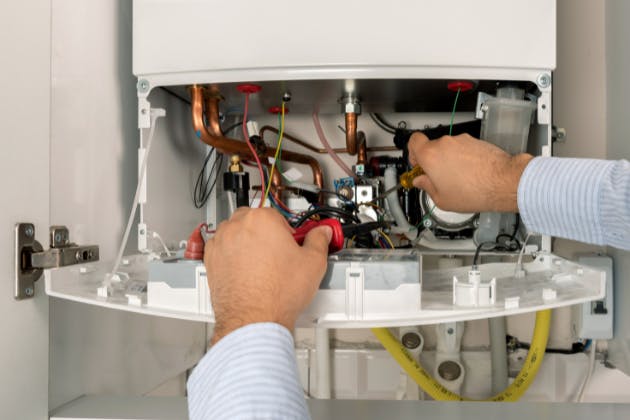Deciding whether to repair or replace your boiler can be a tough call, especially when facing rising energy bills or ongoing breakdowns. With many factors influencing the best course of action, understanding the condition of your current boiler and the long-term costs involved can help you make a smarter, more efficient decision.

When Does a Boiler Repair Make Sense Over a Full Replacement?
Assessing Your Boiler’s Condition
Start by evaluating your boiler’s current performance and condition. Most boilers last between 15 and 20 years. As they near this lifespan, they become more prone to issues and less efficient. If you’re noticing higher energy bills despite consistent usage, your boiler may be losing efficiency.
Common signs your boiler may be struggling include:
- Uneven heating across your home
- Reduced hot water temperature
- Unusual noises like banging or whistling
- Frequent restarts or shutdowns
- Leaks, rust, or visible damage
Maintenance history is another clue. If you're calling out an engineer multiple times each winter, your boiler is likely reaching the end of its serviceable life.
Understanding Repair vs. Replacement Costs
While repairs may seem more budget-friendly in the short term, they can quickly add up. A useful rule of thumb is this: if the cost of repairs is more than 50% of the price of a new boiler, it's usually better to replace it.
For example, if your new boiler would cost £2,000 and the repair is quoted at £1,100, replacing it will save you money in the long run and provide more reliable heating. You should also factor in potential energy savings with a more efficient model, which can significantly lower your bills.
When Repair Might Be Best
There are certain scenarios where opting for a repair is a smart choice:
- Your boiler is under 10 years old and hasn’t had recurring issues
- The fault is minor, such as a frozen condensate pipe or a broken thermostat
- You’re moving house soon and need a short-term fix
- Budget limitations mean a replacement isn’t currently feasible
When to Choose Replacement
In many cases, replacing your boiler is the most cost-effective long-term decision:
- It’s 15+ years old, even if still running, it’s likely inefficient and near the end of its lifespan
- Breakdowns are becoming frequent, causing both expense and inconvenience
- Efficiency has dropped, with older systems potentially running at 60-70% compared to modern condensing boilers achieving up to 98%
- Parts are hard to find, which can make even simple repairs costly
- Your home has changed, such as an extension or added insulation, making your old system unsuitable
Long-Term Energy Savings
Upgrading to an energy-efficient boiler is a financial investment that pays off. Replacing a G-rated boiler with an A-rated condensing model could save you up to £305 annually on energy bills. Over a typical boiler lifespan, that’s thousands in potential savings.
Modern boilers also feature smart controls and better programmability, improving home comfort while using less energy.
Get a Professional Boiler Assessment
While this guide gives a strong foundation for your decision, nothing beats a professional assessment. A qualified engineer can:
- Inspect your entire system for hidden issues
- Provide accurate repair vs. replacement cost estimates
- Evaluate your current energy usage and savings potential
- Recommend suitable boiler models based on your home’s layout and needs
Relying on an expert ensures you're making the right investment in your home’s warmth, safety, and efficiency.
Looking to repair or replace your boiler in Dorset, Poole, or Bournemouth?
Gold BoilerCare offers expert assessments, cost-effective repairs, and efficient boiler replacements tailored to your property. Call us today on 01202 944416 or fill out our contact form to get started.
